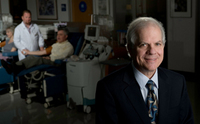Lifesaving Research at Stanford Blood Center
By Erin Crager, Marketing Intern, Stanford Blood Center
The collateral damage associated with chemotherapy and radiation treatment may soon be a thing of the past. Medical students have traditionally been taught that the body’s immune system generally doesn’t turn on itself, even in the presence of a tumor. But Ed Engleman, MD and his research team at Stanford Blood Center have developed a method for training the body’s immune system to do just that for prostate cancer. Their research over the past eighteen years has opened new doors for potentially curing other forms of cancer, as well.
At the moment, the process works by removing white blood cells from the body and training them to fight specific cancerous cells that make up the tumor. Engleman compares it to the way a vaccine works. “What we’re trying to do is to use these cells to educate the immune system to fight the cancer and essentially that’s what you do with a preventative vaccine.” The major difference is this “vaccine” is used for advanced prostate cancer. The difficulty with fighting tumors often has to do with the fact that cancerous cells look identical to cells that make up the tissue from which they derived. Without immunotherapy, as the process is called, the immune system cannot distinguish between these two.
Engleman and his team chose to study prostate cancer for many reasons, but a major deciding factor was that the prostate gland is not essential to live. Before clinical trials were under way, a major concern was the potential for collateral damage in the tissue from which the cancer originated. In the case of prostate cancer this wouldn’t prove to be as detrimental as lung or colon cancer, for example.
The process has proved to be quite accurate, which raises the question of whether other forms of cancer can be cured using the same method. There is still one more hurdle for prostate immunotherapy. Cost. Currently the three-day process of removing cells from the body is laborious and thus quite expensive. Engleman believes that some day it will be possible to train the body’s immune system without isolating the white blood cells. For the time being, the process relies on removal.
Engleman suggested the likelihood that immunotherapy will eventually oust chemo and radiation therapy as the dominant forms of cancer treatment, noting that combining all three could be a much more effective way of treating cancer.
He was quick to point out the importance of the source of research materialthe blood donors. “This would not have been possible without the Blood Center. We have the buffy coats from the donors, without which we wouldn’t have been able to figure out how to isolate these cells. And without the cooperation of the nursing staff and the research staff, none of this would have been possible.”
Click here to watch Engleman’s talk on this subject at a recent Cafe Scientifique event.

